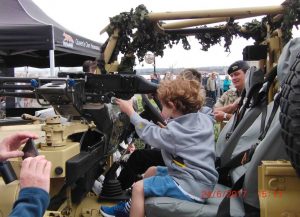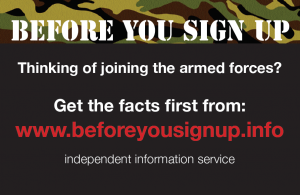In the past few years, there have been reports of a ‘recruitment crisis’ facing the British military, particularly the army. Following cuts made to the regular army, the government put forward the ‘Future Reserve 2020’ plan, to double the size of reservists by 2018 in order to fill the gaps left by cuts.
Yet numbers are still dwindling among both regular and reserve elements of the armed forces despite extensive and expensive marketing campaigns. Military involvement in Afghanistan and Iraq has been largely unpopular, with growing public cynicism about its objectives and success. This has had a negative effect on armed forces recruitment.
To ensure the recruitment of personnel and the public’s support for the forces and their operations, militarisation is on the rise in public spaces and education. Meanwhile, costly and sophisticated recruitment initiatives are romanticising life in the military, while drawing attention away from the causes and consequences of violent conflict and our need to rethink our security approach.
These recruitment initiatives target working class children and young people in particular. The UK recruits children from age 16, and is the only country in Europe to do so.
What is the problem?
Marketing campaigns present a sanitised and romanticised version of life in the military. They focus on the benefits of an armed forces career with little mention of the risks, obligations or ethical challenges involved.
Recruitment materials and activities particularly target children and young people from more disadvantaged backgrounds and with fewer alternative opportunities. They focus on personal development and comradeship that will particularly appeal to those who are most vulnerable.
Armed forces activities within education are designed to interest young people in a forces career, yet the military denies this. The display of weapons and military vehicles hooks young children in to the idea of a military career many years before they are able to consider it with critical awareness. At a time when the number of weapons on the street is increasing3 , it is irresponsible of the armed forces to create a sense of glamour around military hardware, and of the local authorities to allow this.
Enlisting in the military is a decision with serious moral, health and legal implications. Young people and their parents/guardians must be given the opportunity to make a fully informed choice. Many of the risks associated with an armed forces career, including training, combat and after service, are exacerbated for the youngest recruits. Targeting young people for recruitment before they are 18 encourages them to leave mainstream education. Many of these young people will leave training or service early and face unemployment due to a lack of transferable qualifi cations. Adolescents have a greater vulnerability and susceptibility to external pressure, marketing and infl uence and this is exploited by armed forces marketing.
The UK’s policy of recruiting at 16 goes against the international consensus that the minimum age should be 18. It contravenes recommendations from the UN Committee on the Rights of the Child and many other organisations.
Answering questions
Aren’t the armed forces an alternative to crime and poverty for many young people?
Not everyone fares well in the armed forces. The youngest recruits, and particularly those from a disadvantaged background, are more at risk of threat to their long-term physical and mental health, educational outcomes, career options, future relationships and quality of life.
Why is recruiting children an issue when we don’t deploy them until they are adults?
While not deployed until they turn 18, 16- to 18-year-old recruits enter a training environment that can be brutalising and dehumanising, and involves learning to kill. They tend to be channelled into the lowest paid and most dangerous roles. Many leave training or service with few skills and opportunities to fall back on.
How do we recruit people to the armed forces then?
The welfare of children and young people should not be secondary to the military’s recruitment needs. Young people should be given a balanced view of life in the military and should only be allowed to join once they become an adult and are able to make a more informed choice.
“When I was in the Army I remember seeing the Army adverts, and even then you just sort of have a laugh, and think that’s basically a load of rubbish, what they’re saying. When you’re 16, 17 – 15, even, you are massively vulnerable to these things… In my time it was Afghanistan and Iraq, when you see these things glorified you want to be there doing it as well. They’re just easy prey for the army to get hold of. And they know what they’re doing… they’ve obviously got smart people from marketing involved, they’re going to put all this stuff out and make it look really cool.”
Wayne Sharrocks, who was enlisted at 17, did two tours in Afghanistan, where he suffered serious facial injuries.
Facts
The campaign to raise the age of armed forces recruitment to 18 is supported by the UK’s Children’s Commissioners as well as many children’s rights, faith and youth organisations.
A review of the current policy has been called for by the House of Commons Defence Committee and Parliament’s Joint Committee on Human Rights.
Raising the age of recruitment to 18 would:
- safeguard children’s rights and welfare
- encourage children to fully consider whats best for them
- still allow young people to join the military when they are 18
- set a good example to other countries to stop recruiting under-18s into the military



